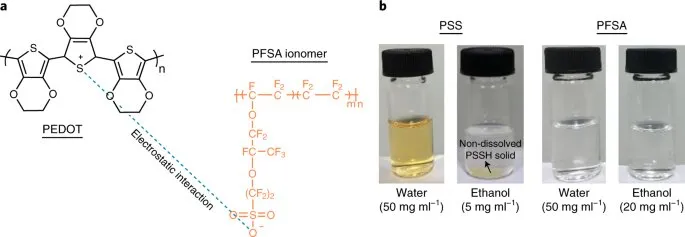A new conducting polymer complex to create stable and fully printable organic solar cells
- In the last few years, engineers worldwide have been trying to establish even more lasting technologies to create electrical energy. Among one of the most promising amongst these solutions are organic solar cells.

Organic solar cells ought to be both effective and stable, to ensure that they can operate accurately and for long periods of time. Ideally, they would certainly additionally be printable utilizing printing technology, as this would streamline their large-scale fabrication.
Hole-transporting materials (HTMs) are a key component of fully printable organic solar cells. One HTM that has actually been considered guaranteeing for the development of printable organic solar cells is poly( 3,4-ethylenedioxythiophene): polystyrene sulfonate (PEDOT: PSS), a classic performing polymer complex that is typically utilized to create printable devices. Regardless of its benefits, PEDOT: PSS usually disperses in water and exhibits a solid acidity, which can adversely impact the performance and stability of PEDOT: SS-based solar cells.
Researchers at Huazhong University of Science and Technology and the Institute of Materials for Electronics and Energy Technology (i-MEET) at Friedrich-Alexander-Universität Erlangen-Nürnberg have lately presented a new alcohol-dispersed and performing polymer complex similar to PEDOT: PSS that overcomes some of the polymer complex's shortcomings. This polymer complex, dubbed PEDOT: F, was introduced in a paper published in Nature Energy.
" The group has been working on conducting polymer of PEDOT: PSS given that it was built up in 2013. The PEDOT: PSS have drawbacks of strong acidity, inadequate wetting and dampness absorption. Those weaken device effectiveness and stability," Yinhua Zhou, one of the researchers who accomplished the research, informed TechXplore.
The key objective of the recent work by Zhou and his colleagues was to overcome the limitations of PEDOT: PSS and enable its usage for the growth of reliable, stable and printable organic solar cells. To do this, they created a new polymer complex formulation that can be distributed in both water and alcohols.
" PEDOT: PSS was created in 1990s and researchers have actually been grumbling concerning its drawbacks from 2000 to today, yet without presenting viable solutions," Zhou claimed. "The new formulation of alcohol-dispersed formulation reported in this work overcomes these drawbacks."
PEDOT: F, the new polymer complex presented by the scientists, has actually perfluorinated sulfuric acid ionomers as counterions. On the other hand with those had in PEDOT: PSS, these ionomers can be dispersed in both water and alcohol.
" The new formulation of PEDOT: F is alcohol-dispersed, which overcomes these drawbacks of standard PEDOT: PSS," Zhou described. "The PEDOT: F helps device performance and stability. It additionally opens the opportunity to fabricate optoelectronic devices with new styles."
The new alcohol-dispersed polymer complex presented by this team of scientists has superb wetting properties and a low acidity. Consequently, it might help to overcome the shortcomings of water-dispersed PEDOT: PSS.
Utilizing their new formulation, Zhou and his colleagues created organic photovoltaics that can be published completely, from their bottom to their top electrode. These devices displayed a power conversion efficiency of 15% and extremely preserved 83% of their initial effectiveness under continual illumination at a maximum power factor tracking for an overall of 1,330 hours.
" In our next research studies, we intend to devise new PEDOT: F formulations," Zhou added. "We additionally intend to utilized PEDOT: F to create new large-area and flexible devices."
Also read

